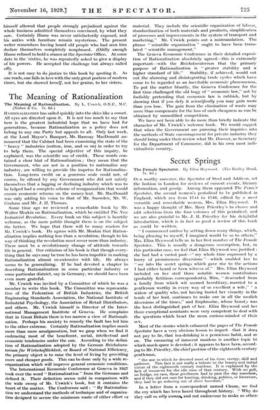The Meaning of Rationalization
The Meaning of Rationalisation. By L. lirwiek, O.B.E.,
(Nisbet & Co. 7s. 6d.) RATIONALIZATION has sailed quickly into the skies like a comet. All eyes are directed upon it. It is not too much to say that here is the greatest industrial hope that we have had for generations, because Rationalization as a policy does not belong to any one Party but appeals to all. Only last week, at the Lord Mayor's Banquet, Mr. Ramsay MacDonald an- nounced that the Cabinet had been examining the state of the " heavy " industries (cotton, iron, and so on) in order to try to help them. The special objective of this inquiry, he explained, was the 'scientific use of credit. These words con- tained a clear hint of Rationalization ; they 'mean that the Government, who are not in a position to nationalize any industry, are willing to provide the impetus for Rationaliza- tion. Long-term credit on a generous scale could not, of course, be offered by any Government who did not satisfy theniselves that a lagging or declining industry which was to be helped had a complete scheme of reorganization that would ensure economic returns on the money lent. Mr. MacDonald was only adding his voice to that of Mr. Snowden, ‘Mr. W. Graham and Mr. J. H. Thomas.
Some time ago we reviewed a remarkable book by Mr. Walter Meakin on Ratidnalization, which he entitled The New Industrial Revolution. Every book on this subject is heartily welcome, as the more public thought there is on the subject the better. We hope that there will be many readers for Mr. Urwick's book. - He agrees with Mr. -Meakin that Ration- aliz.ation implies nothing less than a revolution; though to his way of thinking the revolution must cover more than industry. There must be a revolutionary change of attitude towards life in general. Our criticism of his book is that though every- thing that he says may be true he has been impolitic in making Rationalization almost co-extensive with life. He always seems to be generalizing. If he had devoted a chapter' to describing Rationalization in some particular industry or some particular district, say in Germany, we should have been even more grateful.
Mr. Urwick was invited by a Committee of which he was a member to write this book. The Committee was representa- tive of the Federation of British Industries, the British Engineering Standards Association, the National Institute of Industrial Psychology, the Association of Retail Distributors, and others. Mr. Urwick himself is Director of the Inter- national Management Institute of Geneva. He complains that• in Great Britain there is too narrow a view of Rationali- zation. Perhaps his anxiety to remedy the fault has led him to the other extreme. Certainly Rationalization implies muck more than mere amalgamation, but we gasp when we find it embracing most of the beneficent, social, intellectual and economic tendencies under the sun. According to the defini- tion of Rationalization adopted by the German Reichskura- toritau fir Wirtschaftlichkeit, or Board of National Efficiency, the primary object is to raise the level of living by providing more and cheaper goods. This can be done only by a wide re- organization which will 'improve general economic conditions.
The International Economic Conference at Geneva in 1927 took over the word " Rationalization " from the Germans and defined it. Their definition' seems mild' in comparison with the wide sweep of Mr. Urwick's book; but it contains the heart of the matter. The Conference said : " By Rationaliza- tion we understand the methods of technique and of organiza- tion designed to secure the minimum waste of either effort or material. They include the scientific organization of labour, standardization of both materials and products, simplification of processes and improvements in the system of transport and marketing." Mr. Urwick points out a mistranslation. The- phrase " scientific organization " ought to have been trans- lated " scientific management."
The Geneva Economic Conference in their detailed exposi- tion of Rationalization absolutely agreed—this is extremely important—with the Reichskuratorium that the primary purpose of Rationalization is " greater stability and a higher standard of life." Stability, if achieved, would cut out the alarming and disintegrating trade cycles which have come to be regarded as an inevitable economic phenomenon. To put the matter bluntly, the Geneva Conference for the first time challenged the old bogy of " economic law," not -by foolishly pretending that economic law is rubbish, but by showing that if you defy it scientifically you may gain more than you lose. The gain from the elimination of waste may more than compensate for the loss of such cheapness as can be
obtained by unmodified competition. .
We have not been able to do more than briefly indicate the character of Mr. Urwick's welcome book. We would suggest that when the Government are pursuing their inquiries into the methods of State encouragement for private industry they should bring under their review what Mr. Hoover, as Secretary for the Department of Commerce, did in his own most indi- vidualistic country.








































 Previous page
Previous page